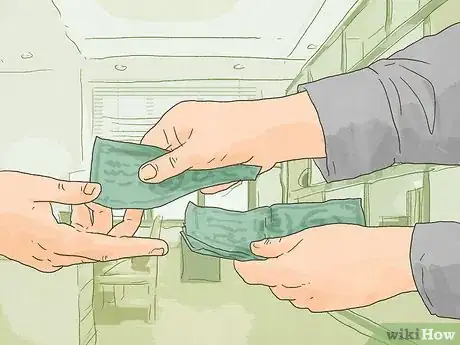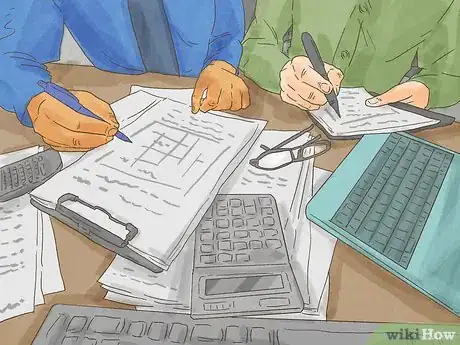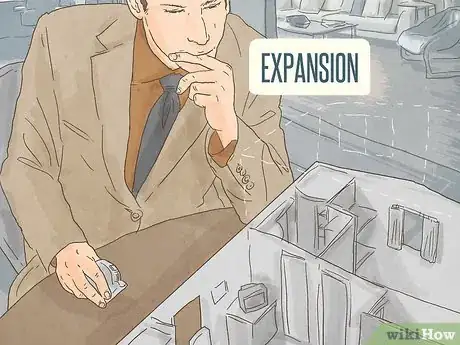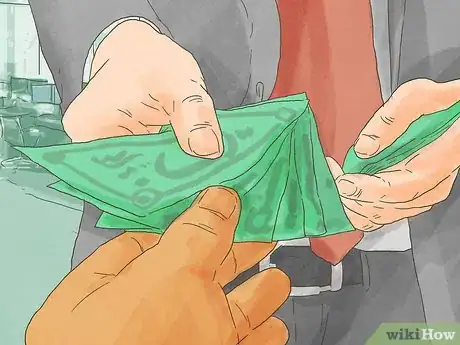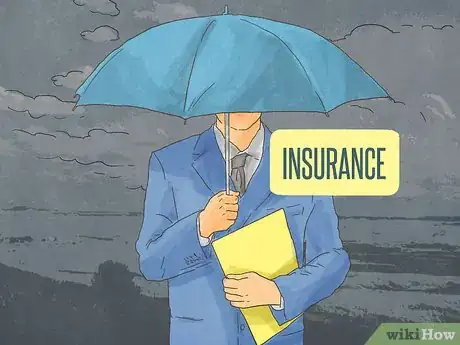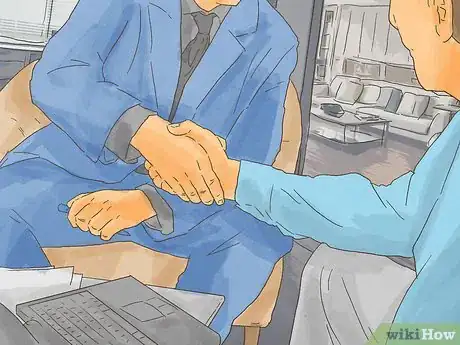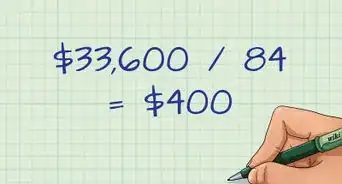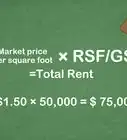This article was co-authored by Michael R. Lewis. Michael R. Lewis is a retired corporate executive, entrepreneur, and investment advisor in Texas. He has over 40 years of experience in business and finance, including as a Vice President for Blue Cross Blue Shield of Texas. He has a BBA in Industrial Management from the University of Texas at Austin.
There are 10 references cited in this article, which can be found at the bottom of the page.
wikiHow marks an article as reader-approved once it receives enough positive feedback. In this case, 94% of readers who voted found the article helpful, earning it our reader-approved status.
This article has been viewed 159,212 times.
Commercial real estate investing can be a lucrative venture for those with the right experience or for those who hire expert advisers. If you are new to investing in commercial real estate properties, there are a number of factors that you should consider before investing, including the risks and benefits of the investment, the type of property you want to acquire, and the best way to protect your personal assets. Each type of commercial property brings with it unique challenges and it is best to surround yourself with experienced investors and professionals to help guide you through the process.
Steps
Evaluating Your Real Estate Investment
-
1Understand the different types of commercial real estate. Commercial real estate isn't just shopping centers and office space. Instead, the term refers to any property used for business purposes, included residential spaces leased out to tenants and raw land that will be developed. The major types of commercial real estate, more specifically, include:
- Retail: These are properties leased to commercial tenants, like malls, strip malls, and other types of shopping centers.
- Residential: These are typically apartments, but can vary widely in their setup (high rise apartments, garden apartments, etc.).
- Hotels: This includes any type of hotel or motel.
- Office: work spaces for businesses.
- Industrial: manufacturing spaces like factories and warehouses.
- Land: this can be either developed or undeveloped (raw) land.[1]
-
2Analyze the benefits of buying commercial real estate. Commercial real estate investment has numerous benefits for potential investors. Depending on the real estate market, the number of leases already in place, and the overall condition of the property, investors can turn a significant profit. Some potential benefits of investing in commercial real estate are:
- Many investors purchase raw land that may increase in value as developers build on surrounding land. In addition, developing the land itself increases its value and attractiveness to other buyers.[2]
- You have the potential to generate significant income, including an annual return on the purchase price that can be 6 percent or higher.
- Unlike residential real estate leases, commercial property owners and tenants both have a vested interest in maintaining the property to support and increase business. This works in favor of the property owner since the property lessee is more likely to invest in creating a workable and attractive space.
- You may be able to enter into a triple net lease, whereby the lessee pays for property expenses and real estate taxes and the buyer is only required to pay the mortgage. Large companies with many retail spaces are more likely to enter into these types of leases.
- Typically, commercial leases are more flexible because they are not regulated as closely as residential leases since the lessee and lessor are typically both business entities.[3]
Advertisement -
3Analyze the risks of commercial real estate investment. In deciding to purchase a property, a potential owner must consider the risks as well as the potential benefits. In evaluating risk, buyers should assess the following risks:
- A buyer must consider how much time they have to dedicate to the management of the property. The owner is responsible for managing each property, assessing safety and maintenance issues, and drafting leases. An investor who wants to see a large return should expect to spend a significant amount of time on the needs of the property.
- If management of the property becomes too burdensome, the buyer might need to retain expert help to manage all aspects of the purchase and maintenance of the property, which could require a significant financial outlay.
- You may be required to put forth a large down payment or put money into replacing a roof or repaving a parking lot.[4]
-
4Examine your investment strategy. While some residential real estate investors will purchase, rehab and resell a property for a profit within a small time frame, commercial real estate investment typically requires a longer time commitment. Some experts recommend that commercial property investors hold onto the property for at least ten years to see a significant and stable return on their investment. If you are looking to make money quickly, with little time commitment, commercial real estate may not be your best option.[5]
-
5Find financing. Generally, individuals cannot finance the purchase of a commercial real estate venture on their own. In order to raise the significant amount of capital that is required in a commercial real estate investment, the investor will generally have to find outside financing. This means applying for a commercial loan, working out seller financing with the current owner, or finding partner investors to raise the funds and to help guide the investment. Finding experienced investors is particularly important for first-time investors. When looking for partners consider the following:
- Do they have experience in commercial real estate transactions?
- Do they have enough cash or credit to help you secure a mortgage?
- What type of investment return do they want?
- What level of management, if any, do they want with the property?
Locating and Retaining Experts
-
1Find an experienced commercial real estate broker. In order to locate and acquire prime commercial real estate, you should hire a commercial real estate broker who has significant experience with commercial properties. When evaluating a broker, consider the following:
- Make sure that your broker is not only experienced in finding property but also in locating potential tenants for the property.
- Make sure that the broker is experienced in commercial transactions and not residential transactions.
- Identify a broker who is established in the community, has an office, and financial stability so that he/she is able to prioritize your business needs and is not focused on their commission or fee.
- Ask other commercial property owners for recommendations. These owners may be the best source in vetting potential brokers.
- Meet with several brokers before you make a decision.[6]
-
2Find a commercial real estate attorney. These attorneys will be experienced in dealing with contracts, property law, and state and local laws regarding real estate transactions. You want to find an attorney who has experience representing commercial real estate buyers. When choosing an attorney, consider the following:
- Retain an attorney that has worked in the community in which you are investing.[7]
- By hiring a local attorney, you can more easily ask former clients for their opinion of the attorney.
- You can locate an experienced attorney by asking for a recommendation from other businesses or by contacting your state bar association and using their attorney referral system.
-
3Hire a certified public accountant (CPA). You want a CPA who is experienced working with commercial real estate transactions. A CPA can help you evaluate the financials of a property, advise you about its investment potential, prepare financial statements and review contracts (although this will primarily be the responsibility of your attorney). Consider the following when identifying a CPA:
- Ask yourself whether the CPA is someone you feel that you can work with for a long time. A good CPA will continue to work with you well beyond the initial purchase of the property so it is important to establish a good working relationship.
- Interview multiple CPAs to get a sense of who would best meet your business needs.
- Ask them to discuss their credentials, services and fees.
- Ask them to discuss their specialization in tax and accounting and whether they could help form an LLC.
- Ask for a list of references for whom they handled commercial real estate-related business.[8]
Locating and Inspecting Properties
-
1Explore a variety of types of commercial properties. When deciding what type of commercial property you want to purchase, ask your broker to explain the different types of commercial properties and the benefits and drawbacks for each. Even if you have invested in commercial property in the past, you should still make a full evaluation of what type of property best suits your current needs. Commercial properties include:
- Office buildings include properties located in central business districts or in suburban office parks.
- Industrial properties include properties for manufacturing as well as warehouses.
- Retail properties include strip malls of varying sizes, regional malls and area set aside for retail chain restaurants or other retail stores.
- Apartment buildings, which may include smaller apartment buildings of 3 to 4 stories, midrise buildings that are between 5-9 floors and include an elevators as well as high rise buildings.
- Many commercial real estate investors focus on raw land, which can either be developed or held with the hope that the land increases in value as other investors develop the land around it.[9]
- Hotels are also a type of commercial property.[10]
- Some investors may think that they would be more comfortable investing in an apartment building because it seems more familiar. Yet, when making your investment you should consider whether an apartment building as opposed to an office building or strip mall meets your specific investment goals. You should also discuss these goals with your lawyer and CPA.
- Be sure to look at a variety of locations as well as property types. The property’s location could significantly impact the rate of return as well as the amount of the initial investment.
-
2Determine available uses. In addition to finding the right location, your property must be zoned for the type of business that you want conducted. When evaluating a property you should determine the following:
- How the property is currently being used.
- Zoning allowances and exclusions for the property—what type of business can and cannot be conducted at the location.[11]
-
3Investigate why the owner is selling the property. There can be any number of reasons why a person or business is looking to sell its commercial property holdings. When looking at specific properties, try to determine:
- Why the owner is selling the property. This information may be able to help you in negotiation.
- Determine if there are any major repairs necessary.
- Explore the area surrounding the property to determine how local business and real estate is doing and whether there are any major changes proposed for the area.[12]
-
4Examine potential expansion. While you may have a modest or semi-modest approach to your investment initially, you should always be thinking about future expansion of the property. You should determine if there is room for growth or are there leasing alternatives if your business fails to thrive.
Establishing Financing and Conducting Due Diligence
-
1Find a lender. Because of the significant cost associated with purchasing commercial property, most buyers have investors and need to secure a loan from a reputable lender. The lender will help you get financing in place to purchase the property. You should look for lenders that are experienced in commercial real estate.
- Consider using a lender with whom you have an established relationship. This may help you to more easily secure the loan.
- Lenders with experience with commercial transactions will be able to direct you to a variety of funding opportunities and should be well versed in any necessary paperwork and regulations.
-
2Have the property inspected. Once you make an offer and the offer is accepted, you need to have the property thoroughly inspected before going forward with the purchase. You want to ensure that they physical property is in working condition and then you can negotiate with the seller over any work, such as a new roof, that is required.[13]
-
3Contact an insurance agent. Before finalizing the purchase, you should speak with an insurance agent about what types of coverage you need for the property if you choose to move forward on the purchase. You want to make sure that your coverage is established and in effect on the date that you become the property owner.[14]
-
4Review all disclosures. The seller is required to turn over information about the property, which includes any physical or environmental issues that impact the property. Depending on the seller’s disclosures, you may need to take additional steps to evaluate any potential environmental impacts and make sure you are following federal environmental law.[15]
-
5Prepare a detailed income and expense analysis. Once you have evaluated the physical property, the potential impact on the environment, and the seller’s disclosures, you should have your experts create a detailed analysis of the potential income and expenses. It is important that you conduct this analysis before purchasing the property in order to verify that it is still a sound investment.[16]
-
6Buy commercial real estate. Have your lawyer explain every detail of the sales agreement so that you understand your rights and obligations. Generally, your sales agreement should contain the following:
- The agreement should be in writing and include any agreements made by the buyer and seller, as well as the signatures of the buyer(s) and the seller(s). If there is a dispute between the parties, the court will closely examine the contract in evaluating the parties’ claims.
- Specify under what circumstances a party can terminate the contract and that the notice of termination must be in writing.[17]
- The agreement should contain the names of the parties, the address and a description of the property, as well as the sale price and the closing date.
- The contract may specify the type of deed that will be delivered to the buyer at closing.
- The buyer should state that the purchase is contingent on getting a mortgage, if applicable.
- The seller should specify that the property is being sold “as is” or outline any work that will be done on the property prior to the closing date.
- The buyer should state that the sale is contingent upon a thorough inspection of the property.
References
- ↑ http://www.propertymetrics.com/blog/2013/02/27/types-of-commercial-real-estate/
- ↑ http://www.investopedia.com/articles/mortgages-real-estate/11/make-money-in-real-estate.asp
- ↑ http://www.nolo.com/legal-encyclopedia/pros-cons-investing-commercial-real-estate.html
- ↑ http://www.nolo.com/legal-encyclopedia/pros-cons-investing-commercial-real-estate.html
- ↑ http://www.forbes.com/sites/ashleaebeling/2012/11/21/buying-main-street-time-to-add-commercial-real-estate-to-your-portfolio/
- ↑ http://www.nolo.com/legal-encyclopedia/clb-look-commercial-real-estate-broker.html
- ↑ http://www.attorneys.com/commercial-real-estate/
- ↑ https://www.biggerpockets.com/renewsblog/2010/05/19/finding-your-cpa-accountant-real-estate-business
- ↑ http://www.investopedia.com/articles/mortgages-real-estate/11/make-money-in-real-estate.asp
- ↑ http://www.propertymetrics.com/blog/2013/02/27/types-of-commercial-real-estate/
- ↑ https://42floors.com/edu/buying-commercial-real-estate/7-steps-to-owning-your-own-commercial-real-estate
- ↑ https://42floors.com/edu/buying-commercial-real-estate/7-steps-to-owning-your-own-commercial-real-estate
- ↑ http://www.forbes.com/sites/ashleaebeling/2012/11/21/buying-main-street-time-to-add-commercial-real-estate-to-your-portfolio/
- ↑ http://media.wiley.com/product_ancillary/40/11181157/DOWNLOAD/Grabel_AppD_ce.pdf
- ↑ http://media.wiley.com/product_ancillary/40/11181157/DOWNLOAD/Grabel_AppD_ce.pdf
- ↑ http://media.wiley.com/product_ancillary/40/11181157/DOWNLOAD/Grabel_AppD_ce.pdf
- ↑ http://blogs.bullrealty.com/index.php?q=blogs/commercialrealestateshow/2013/04/top-mistakes-avoid-commercial-real-estate-contracts#.VoLs1RG0cm8
About This Article
If you want to buy commercial real estate, you have a lot of options, like purchasing a shopping center, a hotel, an office space, or a warehouse. Whichever kind of commercial real estate you invest in, you have the potential to generate a lot of income, including an annual return on the purchase price that can be over 6 percent. However, commercial real estate also comes with risks, like dealing with safety issues or spending a lot of money on repairs. If you're interested, first you'll need to apply for a loan or find outside investors to help finance your investment. To learn how to find commercial properties for sale, scroll down!




